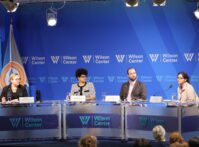-
ECSP Weekly Watch | June 17 – 21
June 21, 2024 By Neeraja Kulkarni
A window into what we are reading at the Wilson Center’s Environmental Change and Security Program
Brazil Joins the Rare Earth Minerals Race to Curb Chinese Dominance (Reuters)
Brazil has the world’s third-largest reserves of rare earth minerals. Yet China dominates that market, accounting for 95% of global production. The mining giant is taking steps aims to break this supply chain dominance by creating a robust rare earth industry of its own. The country’s first rare earths mine, Serra Verde, began commercial production in 2024.
Brazil’s growing participation in rare earth markets aligns with the Western economies’ push to diversify supply chains and steer themselves away from economic dependence on China. Importing magnets used in green energy and defense technologies from Brazil are a clear priority for these nations. Brazil’s advantages as a trading partner include not only abundant rare earth minerals, however. Cheap labor, clean energy, established regulations, proximity to end markets, and the creation of Latin America’s first planned magnet plant are also part of the equation.
Despite these advantages, however, Brazil faces several challenges. One major obstacle for Brazil is that rare earth mineral prices have plummeted by approximately 70%, hindering companies from raising funds for mines and processing what is extracted. Unlike China, Western companies have yet to perfect the required complex processing technologies, so investment in research and development is necessary. For its part, Brazil’s government aims to promote both element separation technologies and supply chain development by encouraging production and building partnerships. It is also exploring rare earth recycling technologies.
READ| US Governance on Critical Minerals
EU’s New Green Law Creates Political Rifts (The Guardian)
The European Union (EU)’s Green Deal aims to put the continent on the path to a green transition and achieve climate neutrality by 2050. So when the EU) passed the groundbreaking Nature Restoration Law in February 2024 as part of that policy package Green Deal, it sets a target to restore 20% of the EU’s land and sea by 2030. Yet the controversial law has faced hurdles from the outset, even as Ireland urged other member states to avoid backtracking on previously agreed-upon goals.
The Nature Restoration Law received assent from 20 countries. Belgium abstained. Hungary, Italy, Finland, the Netherlands, Poland, and Sweden all voted against it. (Hungary opted out in March.) Opponents criticized the costs and administrative burdens attached to the measure. Farmer lobbyist groups fear the law will endanger their livelihoods, reducing the land needed to cultivate food and satisfy the needs of the population. They promise legal battles in regional, national, and European courts if the law is enforced.
A dramatic turnaround by Austria is credited with saving the proposal. But that “yes” vote has led to political chaos within the country. Austria’s environmental minister Leonore Gewessler, was threatened with legal action as she voted in favor of the law. Experts now predict a major rift between parties in Austria’s governing coalition as a result, as the Greens control the environment ministry, while the ÖVP controls agricultural policy. Meanwhile, environmental groups such as WWF and Greenpeace see the law a major victory for conservation that will secure the needs of future generations.
READ | Climate Security and Europe’s Greens: A Match Made in Political Heaven?
Uncovering Networks of Illicit Wildlife Trade in the Amazon (Mongabay)
Transparency International’s new report, The Wildlife Laundromat: How risks of fraud, corruption, and laundering drive wildlife trafficking dives deep into the illicit wildlife trade channels in the Brazilian Amazon. It identifies both practices and a variety of actors involved, declaring at least 24 practices of fraud, corruption, and laundering, while extensively laying out the wildlife trade supply chains.
Corruption exists on all levels of the supply chain, and results in elaborate efforts to smuggle live animals, animal parts, and wildlife products. The report observes that smugglers tend to falsify all documents to make it appear that the trade is legal, allowing them to sell trafficked animals at double the market cost. The criminality also leads to violence when drug smugglers get involved in the illicit wildlife trade, blurring the line between actors. Journalists have been killed while investigating these activities, reflecting the complex security issues attached to monitoring these channels.
Because the Amazon is such a large territory, experts emphasize the need for efficient data collection. The reports also suggests that Brazil’s government agencies must efficiently share collected data internally to avoid any discrepancies. And an overall national plan to combat illegal wildlife trafficking, aligned with drug control mechanisms and other security measures, is essential to combat this ever-worsening situation.
Read more in IUCN’s newly published report, ‘Planet on the move: reimagining conservation at the intersection of migration, environmental change, and conflict,’ featuring contributing author and ECSP Program Director, Lauren Herzer Risi.
Sources: Mongabay, The Guardian, Reuters, European Parliament, Transparency International, Politico, Clean Energy Wire, Mining Technology, WWF, IUCN
 A Publication of the Stimson Center.
A Publication of the Stimson Center.







